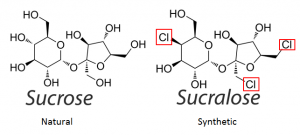Artificial Sweeteners Can Contribute to Diabetes . . . Through the Gut
It is no surprise to anyone that diabetes is on the rise. Yet you might be surprised to find out that one of the reasons is associated with something often recommended to those that are diabetic, or even those that just wish not to gain weight. What I am referring to are artificial sweeteners. Artificial sweeteners are often incorporated into foods as a safe option to natural sugars with the premise being that the use of these will not raise blood glucose levels and worsen the condition of diabetes. Basically they are being used as a safer alternative to natural sugars. The truth is they are not.
The Source of the Problem
Artificial Sweeteners have been used for several years and marked as options that those suffering from blood sugar problems can safely use to reduce elevations in glucose. The theory is that since the artificial sweetener does not contain calories therefore it should not cause a spike in glucose. What the artificial sweetener can do is promote a stimulus to our nervous system that registers as sweet. The assumption was that the use of an artificial sweetener would not allow blood sugar levels to increase since it did not contain calories, while at the same time providing the sweet taste often sought after.
Today, we recognize many of these artificial sweeteners by their trade names. The most common examples include Equal, Sweet’N Low, acesulfame potassium and Splenda (sucralose). Among these, Splenda is probably the most popular. This should not be of surprise since it is 600 times sweeter than table sugar (Food Chem Toxicol. 2010 Nov;48(11):3067-72.). Splenda has been given the label of safe, but like some of its counterparts, the testing used to draw the conclusion that artificial sweeteners are safe is questionable and was likely approved through the FDA without proper testing (Int J Occup Environ Health. 2010 Jan-Mar;16(1):89-96.). It appears that where many of these studies fail is that they are assessing acute dosages. There is virtually no acute toxicity that is observed. However, the accumulated use of artificial sweeteners over time tells a much different story.
The Real Effects of Artificial Sweeteners
As with most things that are introduced into the body that are man-made, artificial sweeteners are not safe and have been shown to have ill effects on human health. Ironically, diabetes, a condition thought to be aided by the use of artificial sweeteners, is actually made worse. The mechanism has been defined through the gastrointestinal tract. Again, this emphasizes the point that if the gut is not healthy, disease is on the horizon. As it relates to the use of artificial sweeteners, they alter the growth of bacteria in our guts. This altered gut environment is created when the most beneficial strains of our probiotics are decreased, leading to either a lack of diversity in our colons or the overgrowth of strains that are least beneficial to the bowels, or even harmful. With the establishment of this environment, metabolic conditions such as insulin resistance and its progressed form, diabetes, are made worse. In short glucose intolerance develops through unfavorable changes in the gut microorganism balance that are promoted by the use of artificial sweeteners (Nature. 2014 Oct 9;514(7521):181-6.)
While some may argue that artificial sweeteners do not have acute toxic effects and that they are a better option for those that wish to control or avoid diabetes, new evidence suggests otherwise. Numerous studies now show that the results of routine artificial sweetener consumption do indeed have negative effects on balancing blood glucose, though the effects are indirect by way of changes to the balance of microorganisms in the gut. So while an immediate effect on blood glucose levels may not be seen, what is seen long term is a worsening of the metabolic state. Moreover, the change in gut composition that leads to impaired glucose tolerance is also a well-established culprit in many other chronic diseases. It is blatantly a contributor to a slow, toxic death.
References for the negative effects of artificial sweeteners on the gut:
Cell Metab. 2014 Nov 4;20(5):701-3. A bitter aftertaste: unintended effects of artificial sweeteners on the gut microbiome.
Nat Rev Endocrinol. 2014 Nov;10(11):637. Gut microbiota: not so sweet–artificial sweeteners can cause glucose intolerance by affecting the gut microbiota.
Nature. 2014 Oct 9;514(7521):176-7.Health: The weighty costs of non-caloric sweeteners.



Hello Dr. Hill,
I think another great source for this topic would be Dr. Natasha McBride’s Book “GAP” (Gut and psychology syndrome).
She is very interesting, especially in the documentary “Statin Nation”.
Thanks for the info.
Alex